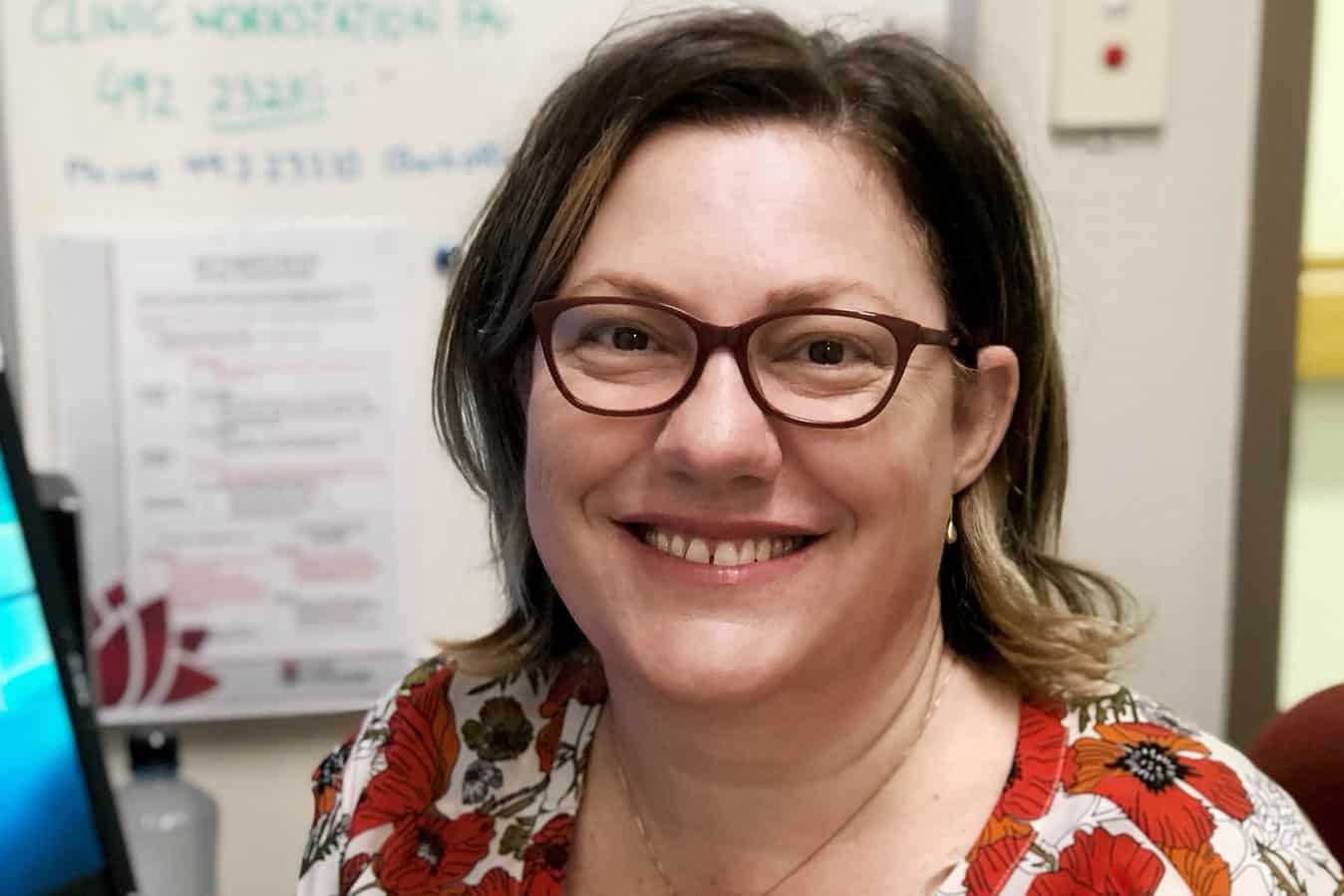In 2003, registered nurse Susan Agland found herself in the right place at the right time.
Having worked in neurosurgery for the previous decade, Susan stumbled into the field of Neuroimmunology after taking up an opportunity to work on an MS study exploring levels of vitamin D in patients living with the chronic neurological condition, which affects the central nervous system.
“It was meant to be a brief reprieve from working shift work and working on wards but it turned out that it was much more engaging and exciting doing that research,” recalls Susan.
Her involvement led to a position with then new specialist Multiple Sclerosis Clinic at the John Hunter Hospital in Newcastle.
“We had the opportunity to set it up how we wanted to as it wasn’t an existing service,” Susan says.
“I really identified with the patient population as I was a very similar age to them and, obviously, they’re more often women than men.
“I enjoyed being able to work outside the normal limitations of a ward setting where we’re looking to try to keep people well and treat them holistically.”
A Multiple Sclerosis Clinical Nurse Specialist, Susan’s role includes meeting patients, triaging new symptoms and helping patients navigate their journey with MS. The clinic hasn’t stopped growing since it was established and receives about 50 new referrals each year.
“We really push the patient at the forefront of the model of care,” explains Susan.
“We don’t tell people what they have to do, we provide all the information they need and help them work out how to best live their life. It is multidisciplinary but it’s also holistic, almost integrated care. We talk about diet and exercise and all the other lifestyle factors that can be managed, not just medications.”
Susan didn’t have to undertake any formal training to become an MS nurse, however, did complete a postgraduate certificate in MS Neuroscience.
A typical day at the clinic involves seeing outpatients who travel from across Newcastle to several hours away. Telehealth is also offered.
Once people have been diagnosed with MS, Susan works with them to develop a treatment plan to help them manage with as little disruption to their lives as possible.

There are two dedicated MS nurses at the clinic and a massive 1,200 patients on the books, meaning resources are often stretched. Still, access to MS treatment and support is significantly better than most regional and rural areas.
“The incidence and prevalence of MS has continued to grow since I’ve been here at the clinic,” Susan reveals.
“[These days] we understand the role that genetics plays much more clearly and we have gone through an evolution of treatments that just goes from modulating to being very specific in supressing someone’s immune system and we can tailor treatments to that person’s specific needs.”
The best part of the job?
“I enjoy providing care that is what the patient needs, so listening to the patient and being able to work around what their needs are so that MS becomes a portion of their life but it’s not their entire life or identity,” Susan says.
While inroads have been made in care, community misconceptions remain.
“Lots of people think that people with MS are going to be stuck in a wheelchair for the rest of their lives but the new population of people who are getting access to very effective treatments early on in the disease are probably not going to end up like that.”
The shortage of MS nurses to support Australians living with the chronic condition is another hurdle.
A landmark report published earlier this year by peak advocacy body MS Australia, MS Nurse Care in Australia, found one-third of people living with multiple sclerosis do not have access to vital specialist MS nursing care.
Leading reasons for MS patients not receiving nursing care included an MS nurse not being available where they lived or at the neurological practice they visit; they didn’t know MS nurses existed; or that they believed they were not eligible to receive such care. The report found the lack of care contributes to poorer health outcomes such as higher disability levels, faster disease progression, more severe symptoms, and greater levels of depression.
There is currently just 90 MS Nurses across Australia to care for the 25,600 people living with the condition, or one nurse for 284 patients. To improve access and outcomes, MS Australia has called on all levels of government to prioritise nurse care and increase the workforce by 50 nurses, which would cost $5 million annually.
The report made four key recommendations
- Raising awareness of MS nurses, their value and the supports and services they provide to people with MS and health practitioners.
- Assisting the existing MS Nurse workforce through increased training, including mentorship and preceptorship, and exploring opportunities to include education about MS nurses within undergraduate curriculums.
- Increasing the number of MS nurses through targeted advocacy and by securing funding.
- Increasing access to MS nurses by initiatives such as the expansion of telehealth services. This would require amendments to Medicare, which currently covers telehealth appointments with neurologists, but not MS nurses.
“I’m outraged as a nurse and it tells me why I’m so busy because we see a lot of patients come from outside of my local region, specifically the far north coast,” says Susan.
“The fact that I’m a phone call away to answer questions or help people navigate the hospital system is so important. We know from the report that people are less likely to present unnecessarily to emergency departments. They’re less likely to have poor quality of life and they’re less likely to be disabled if they have access to an MS nurse.”
Susan believes MS nurses can make a real difference in the lives of patients and encourages early career nurses to find out more.
“Nurses should be taking any opportunity that comes their way,” says Susan.
“I think that’s for all nurses. If I didn’t say yes to that small opportunity of doing a project that was short ending, I would never have ended up doing this.”








